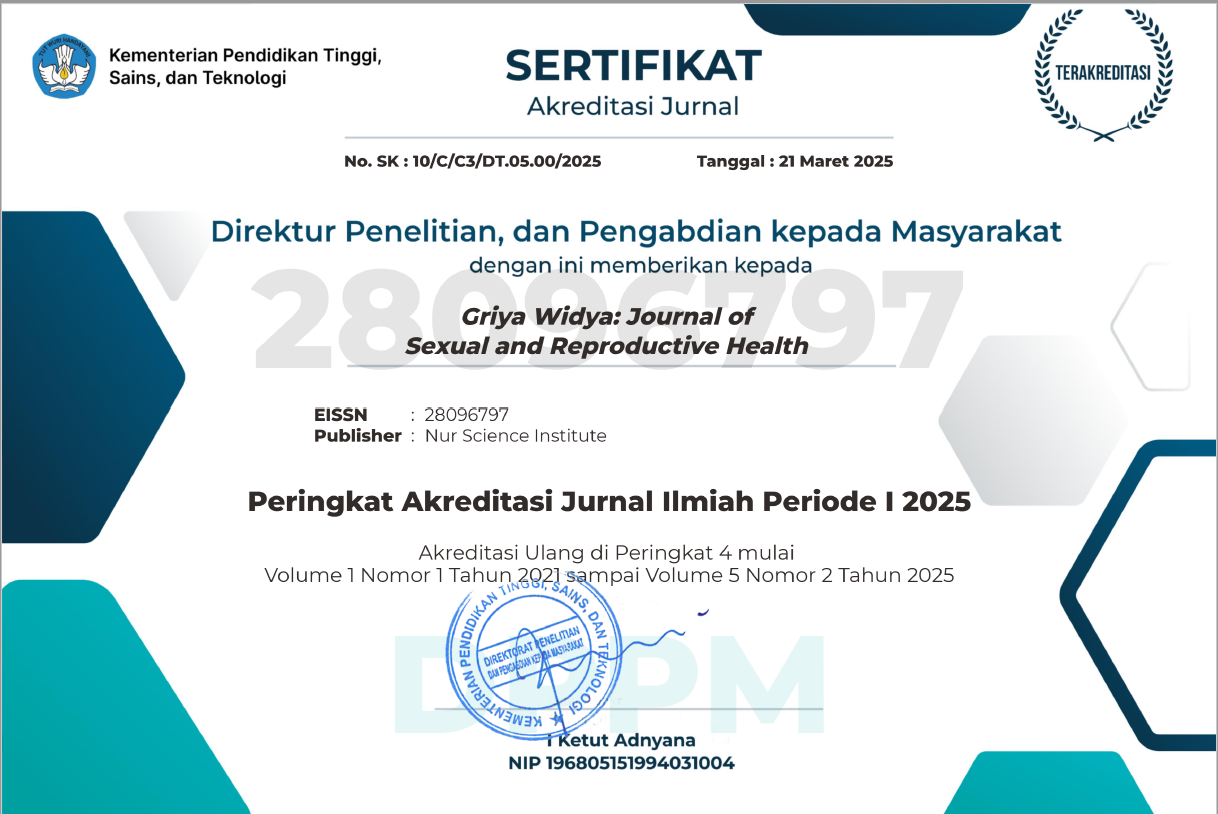Efektifkah Pendidikan Kesehatan Reproduksi Remaja oleh Teman Sebaya?
Sebuah Kajian Literatur
DOI:
https://doi.org/10.53088/griyawidya.v1i1.247Keywords:
kajian literatur, pendidikan kesehatan reproduksi, pendidik sebaya, HIV AIDSAbstract
Background: Adolescence is a period of rapid growth and development both physically, psychologically and intellectually. Some of the health problems that can be experienced by adolescents, one of which is about risky behavior from premarital sex to HIV, factors that can cause adolescents to engage in risky sexual behavior include lack of education or knowledge and attitudes of adolescents about the importance of maintaining reproductive health. This literature review aims to determine the effect of providing adolescent reproductive health education by peers on knowledge and attitudes about adolescent reproductive health and HIV.
Method: The articles used in this literature review is 5 articles with searches conducted through Google Schoolar, PubMed, and Garuda using the keywords 'adolescent reproductive health education', 'adolescent HIV health education', and health education by peers'. The inclusion criteria of this literature review are the articles used indexed by SINTA, Scopus, Scimago or having ISSN, Full text, published in 2011-2021, and using themethod quasi-experimental. The method used is to summarize the five selected journals, analyze, and draw conclusions.
Results: The results in research journals show value < 0.05 and value = 0.0001 < which means that there is an effect of providing reproductive health education by peers on knowledge and attitudes about adolescent reproductive health and HIV.
Conclusion: There is an influence of adolescent reproductive health education by peers on knowledge and attitudes about adolescent reproductive health and HIV. Suggestions for future research are expected to pay more attention to procedures and measurement of research results using health education methods by peer educators.
References
Adeomi, A. A., Adeoye, O. A., Asekun-Olarinmoye, E. O., Abodunrin, O. L., Olugbenga-Bello, A. I., & Sabageh, A. O. (2014). Evaluation of the effectiveness of peer education in improving HIV knowledge, attitude, and sexual behaviours among in-school adolescents in Osun State, Nigeria. AIDS research and treatment, 2014.
Adyani, S. A. M., Muflih, M., & Syafitri, E. N. (2019). Kerentanan Kehamilan Remaja Dan Konseling Sebaya: Tinjauan Teori. Jurnal Keperawatan Respati Yogyakarta, 6(1), 552-557.
Andayani, L. S., & Juliandi Harahap. (2017). Pengaruh Peer Education terhadap Pengetahuan dan Sikap Mahasiswa Universitas Sumatera Utara mengenai HIV/AIDS. Semanticscholar, 161–166.
Astari, R., & Fitriyani, E. (2019). Pengaruh Peer Education terhadap Pengetahuan dan Sikap Remaja Tentang Pencegahan Hiv-aids di Smk Korpri Majalengka. Jurnal Ilmu Kesehatan Bhakti Husada: Health Sciences Journal, 10(2), 143-152.
Avilla, E. A. S. (2019). Pengaruh peer educator terhadap peningkatan pengetahuan dan sikap remaja mengenai HIV AIDS di Pontianak Barat. Jurnal ProNers, 4(1).
BKKBN. (2014). Pedoman Penyelenggaraan Pendidikan dan Pelatihan Fungsional Dasar Bidang Pengendalian Penduduk, Keluarga Berencana, dan Pembangunan Keluarga bagi Penyuluh Keluarga Berencana. Diunduh tanggal 19 Maret 2017, darihttps://www.bkkbn.go.id.
Fitriyani, T. and Oktanasari, W. (2019). Hubungan Tingkat PengetahuanTentang Keputihan DenganPenanganan Keputihan Pada SiswiKelas X SMK YPE Sumpiuh Kabupaten Banyumas Tahun 2018. Kesmas Indonesia, 11(2), p. 131.doi: 10.20884/1.ki.2019.11.2.1428.
Kemenkes RI. (2015). Infodatin Situasi Kesehatan Reproduksi Remaja.
Kemenkes RI. (2018). Profil Kesehatan Indonesia Tahun 2017. Jakarta: Kemenkes RI.
Lestary, H., & Sugiharti, S. (2011). Perilaku berisiko remaja di Indonesia menurut survey kesehatan reproduksi remaja indonesia (SKRRI) Tahun 2007. Indonesian Journal of Reproductive Health, 1(3), 136-144.
Oktarina, J., Marono, H. M., & Purnomo, W. (2017). Pengaruh Pendidikan Kesehatan Reproduksi oleh Sebaya Terhadap Pengetahuan dan Sikap dalam Pencegahan Seks Pranikah di SMAN 1 Sukamara, Kabupaten Sukamara, Kalimantan Tengah. Buletin Penelitian Sistem Kesehatan, 20(1), 26-33.
Rosmiati,R., Jindar,SW. (2020). Dampak Pengetahuan Terhadap Kecemasan Dalam Menghadapi Menarche Pada Remaja Putri di SMP Negeri 12 Makassar. Jurnal Kesmas Indonesia, 12(1), pp. 1–8.
Survei Demografi dan Kesehatan Reproduksi.(2017). Kesehatan Reproduksi Remaja. Jakarta: BKKBN Indonesia.
Wartonah dan Tarwoto. (2015). Kebutuhan Dasar Manusia dan Proses Keperawatan. Jakarta: Salemba Medika.
Winarti, Y., & Ernawati, R. (2019). Effectiveness of Peer Education Method in Increasing Knowledge and Attitude towards HIV/AIDS Prevention among Students in Samarinda. IJNP (Indonesian Journal of Nursing Practices), 3(2), 105-110.
Downloads
Published
How to Cite
Issue
Section
License
Authors who publish with this journal agree to the following terms:
The author(s) retain copyright and grant the journal the right of first publication with the work simultaneously licensed under a CC BY-SA 4.0 license that allows others to remix, adapt, and build upon the work even for commercial purposes, as long as they credit the author(s) and license their new creations under the identical terms.
License details: https://creativecommons.org/licenses/by-sa/4.0/
Most read articles by the same author(s)
- Iin Istiqomah, Giat Purwoatmodjo, Tanjung Anitasari Indah Kusumaningrum, Pengaruh Media Leaflet terhadap Peningkatan Pengetahuan Wanita Usia Subur dalam Pemilihan Kontrasepsi IUD , Griya Widya: Journal of Sexual and Reproductive Health: Vol. 1 No. 2 (2022): Griya Widya: Journal of Sexual and Reproductive Health



